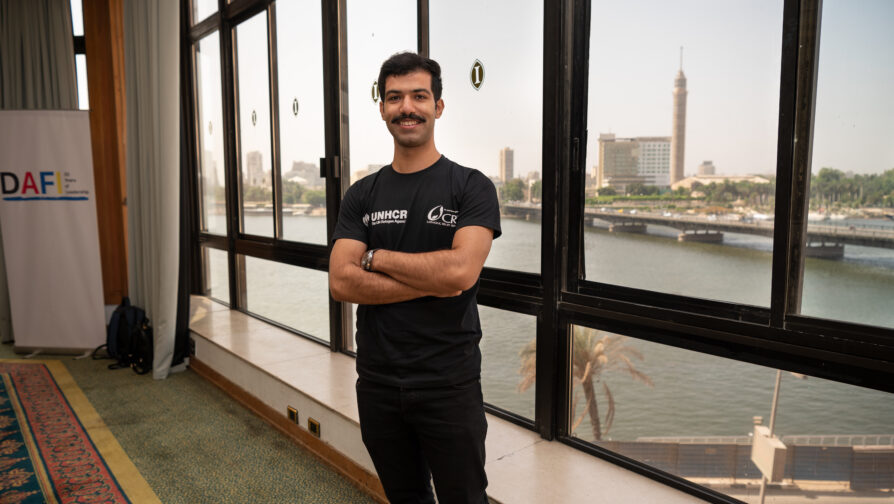This year marks 30 years of the DAFI scholarship programme that empowers refugee youth by providing them with an opportunity to enrol in higher education in their country of asylum or home country.

Nabaa, an Iraqi refugee in Egypt, sharing with new DAFI scholars how to get prepared for the job market.
The daily walk to the university or school is a habit for many students. To refugees, it reminds them of the route to reach safety. It is an arduous journey that millions of refugees were able to pass, but how many of them have been fortunate to have the opportunity to continue their university studies and aspire for a better future?
“Eleven years ago, I was deprived of school because of the war, like many other Syrian children. Childhood became a luxury we no longer have, and I was obligated to give up on my dreams. I even thought this was the end of my academic journey and that I would not get a chance to continue my studies,” said Ahmed, a 23-year-old Syrian refugee living in Cairo. He used to live with his family peacefully in Aleppo; he loved his school and friends and never thought of ending up as a refugee one day.
In 2013, the family decided to seek asylum in Egypt after they faced harsh living conditions, without a livelihood, water or electricity for years. The scatters of war left their marks on Ahmed’s life, although he is thankful for the journey that was a turning point in his life. “The war shaped who I am now and made me believe that I should not succumb to harsh situations and that the only guarantee of a better future is education,” says Ahmed.
One year later, Ahmed returned to school in Egypt and is now enrolled in the Faculty of Agriculture at Zagazig University on the Albert Einstein German Academic Refugee Initiative Scholarship (DAFI).
DAFI covered my tuition fees, without which I would not have been able to obtain a bachelor’s degree
“DAFI covered my tuition fees, without which I would not have been able to obtain a bachelor’s degree, and CRS -UNHCR Partner – supports me in every step I take,” said Ahmed about how the scholarship is developing his educational journey.
DAFI empowers refugee youth by providing them with an opportunity to enrol in higher education in their country of asylum or home country. It also offers training sessions and workshops to its scholars, preparing them for the job market.

Ahmed, a Syrian refugee, posing for the camera during the graduation ceremony of DAFI scholars.
When asked about his dreams, Ahmed said, “I believe in the power of youth, and we should start taking climate action to save our world. We need to raise awareness on the impact of climate change and how we can face it through eliminating food waste, reducing energy use, and planting trees in our communities.”
Ahmed’s interest in climate change came as no surprise, as he chose to study Food Science and Agriculture after he finished high school in Egypt in 2018. Ahmed is one of the thousands of students who have benefited from the DAFI scholarship over the years.
I have two brothers who are doctors, and I am an engineer. If we had stayed in Iraq, we would not have reached where we are now
Nabaa, a 24-year-old Iraqi refugee in Egypt, is another DAFI scholar who graduated from Suez University in 2020 after she studied Petrochemical Engineering. “My father faced persecution in Iraq, and our house was constantly raided. I did not know the meaning of safety as a child. In Egypt, we were able to build a bright future for ourselves. I have two brothers who are doctors, and I am an engineer. If we had stayed in Iraq, we would not have reached where we are now,” said Nabaa.
Nabaa is one of the unique students who lent a hand to her refugee colleagues by joining DAFI’s clubs to deliver capacity-building training to new scholars. “I gained a lot of skills from DAFI’s extracurricular activities, and now I train new scholars on different skills, including how to use Microsoft programs,” she added.
This year marks 30 years of the DAFI scholarship programme. During those years, DAFI has graduated generations of doctors, engineers, and artists in refugee hosting communities. Thanks to the governments of Germany, Denmark and the Czech Republic, UNHCR and other private donors, the programme has supported over 18,500 young refugees in different countries since 1992.
Share on Facebook Share on Twitter